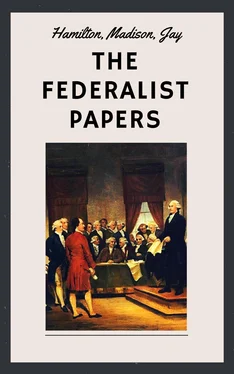Because, even if the governing party in a State should be disposed to resist such temptations, yet as such temptations may, and commonly do, result from circumstances peculiar to the State, and may affect a great number of the inhabitants, the governing party may not always be able, if willing, to prevent the injustice meditated, or to punish the aggressors. But the national government, not being affected by those local circumstances, will neither be induced to commit the wrong themselves, nor want power or inclination to prevent or punish its commission by others.
So far, therefore, as either designed or accidental violations of treaties and the laws of nations afford JUST causes of war, they are less to be apprehended under one general government than under several lesser ones, and in that respect the former most favors the SAFETY of the people.
As to those just causes of war which proceed from direct and unlawful violence, it appears equally clear to me that one good national government affords vastly more security against dangers of that sort than can be derived from any other quarter.
Because such violences are more frequently caused by the passions and interests of a part than of the whole; of one or two States than of the Union. Not a single Indian war has yet been occasioned by aggressions of the present federal government, feeble as it is; but there are several instances of Indian hostilities having been provoked by the improper conduct of individual States, who, either unable or unwilling to restrain or punish offenses, have given occasion to the slaughter of many innocent inhabitants.
The neighborhood of Spanish and British territories, bordering on some States and not on others, naturally confines the causes of quarrel more immediately to the borderers. The bordering States, if any, will be those who, under the impulse of sudden irritation, and a quick sense of apparent interest or injury, will be most likely, by direct violence, to excite war with these nations; and nothing can so effectually obviate that danger as a national government, whose wisdom and prudence will not be diminished by the passions which actuate the parties immediately interested.
But not only fewer just causes of war will be given by the national government, but it will also be more in their power to accommodate and settle them amicably. They will be more temperate and cool, and in that respect, as well as in others, will be more in capacity to act advisedly than the offending State. The pride of states, as well as of men, naturally disposes them to justify all their actions, and opposes their acknowledging, correcting, or repairing their errors and offenses. The national government, in such cases, will not be affected by this pride, but will proceed with moderation and candor to consider and decide on the means most proper to extricate them from the difficulties which threaten them.
Besides, it is well known that acknowledgments, explanations, and compensations are often accepted as satisfactory from a strong united nation, which would be rejected as unsatisfactory if offered by a State or confederacy of little consideration or power.
In the year 1685, the state of Genoa having offended Louis XIV., endeavored to appease him. He demanded that they should send their Doge, or chief magistrate, accompanied by four of their senators, to FRANCE, to ask his pardon and receive his terms. They were obliged to submit to it for the sake of peace. Would he on any occasion either have demanded or have received the like humiliation from Spain, or Britain, or any other POWERFUL nation?
PUBLIUS
FEDERALIST No. 4. The Same Subject Continued (Concerning Dangers From Foreign Force and Influence)
For the Independent Journal. Wednesday, November 7, 1787
JAY
To the People of the State of New York:
MY LAST paper assigned several reasons why the safety of the people would be best secured by union against the danger it may be exposed to by JUST causes of war given to other nations; and those reasons show that such causes would not only be more rarely given, but would also be more easily accommodated, by a national government than either by the State governments or the proposed little confederacies.
But the safety of the people of America against dangers from FOREIGN force depends not only on their forbearing to give JUST causes of war to other nations, but also on their placing and continuing themselves in such a situation as not to INVITE hostility or insult; for it need not be observed that there are PRETENDED as well as just causes of war.
It is too true, however disgraceful it may be to human nature, that nations in general will make war whenever they have a prospect of getting anything by it; nay, absolute monarchs will often make war when their nations are to get nothing by it, but for the purposes and objects merely personal, such as thirst for military glory, revenge for personal affronts, ambition, or private compacts to aggrandize or support their particular families or partisans. These and a variety of other motives, which affect only the mind of the sovereign, often lead him to engage in wars not sanctified by justice or the voice and interests of his people. But, independent of these inducements to war, which are more prevalent in absolute monarchies, but which well deserve our attention, there are others which affect nations as often as kings; and some of them will on examination be found to grow out of our relative situation and circumstances.
With France and with Britain we are rivals in the fisheries, and can supply their markets cheaper than they can themselves, notwithstanding any efforts to prevent it by bounties on their own or duties on foreign fish.
With them and with most other European nations we are rivals in navigation and the carrying trade; and we shall deceive ourselves if we suppose that any of them will rejoice to see it flourish; for, as our carrying trade cannot increase without in some degree diminishing theirs, it is more their interest, and will be more their policy, to restrain than to promote it.
In the trade to China and India, we interfere with more than one nation, inasmuch as it enables us to partake in advantages which they had in a manner monopolized, and as we thereby supply ourselves with commodities which we used to purchase from them.
The extension of our own commerce in our own vessels cannot give pleasure to any nations who possess territories on or near this continent, because the cheapness and excellence of our productions, added to the circumstance of vicinity, and the enterprise and address of our merchants and navigators, will give us a greater share in the advantages which those territories afford, than consists with the wishes or policy of their respective sovereigns.
Spain thinks it convenient to shut the Mississippi against us on the one side, and Britain excludes us from the Saint Lawrence on the other; nor will either of them permit the other waters which are between them and us to become the means of mutual intercourse and traffic.
From these and such like considerations, which might, if consistent with prudence, be more amplified and detailed, it is easy to see that jealousies and uneasinesses may gradually slide into the minds and cabinets of other nations, and that we are not to expect that they should regard our advancement in union, in power and consequence by land and by sea, with an eye of indifference and composure.
The people of America are aware that inducements to war may arise out of these circumstances, as well as from others not so obvious at present, and that whenever such inducements may find fit time and opportunity for operation, pretenses to color and justify them will not be wanting. Wisely, therefore, do they consider union and a good national government as necessary to put and keep them in SUCH A SITUATION as, instead of INVITING war, will tend to repress and discourage it. That situation consists in the best possible state of defense, and necessarily depends on the government, the arms, and the resources of the country.
Читать дальше












